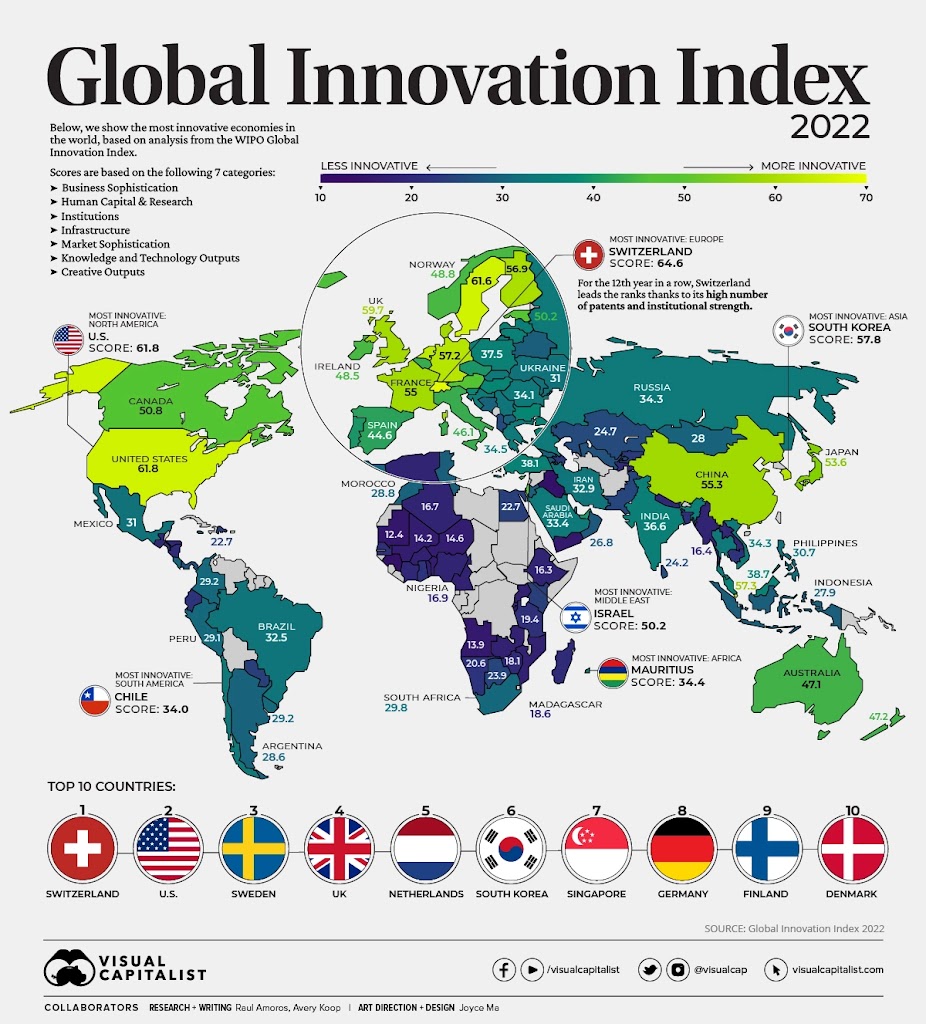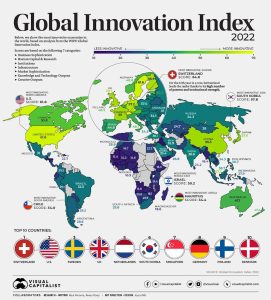Welcome to WordPress. This is your first post. Edit or delete it, then start writing!
Category: Uncategorized
-

Innovative Countries — Global Innovation Index
This is a great summary of innovation by country from Visual Capitalist. See the Global Innovation Index (GII) map here:https://www.visualcapitalist.
com/most-innovative-countries- 2022/ We,
at Strategic Business Planning Company, www.SBP.com, are always
interesting in all aspects of innovation. Sometimes we hear from a
layperson or an executive that the most innovative country in the work
is …Israel and Ireland were
mentioned in recent years. One executive said that “all innovation
comes from Israel”. All right, admittedly, Israel is a great source of
innovation and invention, but it is a very small country (population,
GDP). In absolute terms, Israel is not even close, but in relative terms
(adjusted for size of country), Israel is a very respectable #16 in the
world (GII score of 50.2).So,
a quick search came up with this great source at Visual Capitalist
shows that the top 6 countries are: Switzerland, USA, Sweden, and the UK
all with innovation scores above 60. The rest of the top 10 had
innovation scores over 56.Rank
Country / Region
Score
1
Switzerland
64.6
2
U.S.
61.8
3
Sweden
61.6
4
United Kingdom
59.7
5
Netherlands
58.0
6
South Korea
57.8
7
Singapore
57.3
8
Germany
57.2
9
Finland
56.9
10
Denmark
55.9
Here is the summary of how the Global Innovation Index is developed/designed. (quote)
Innovation is inherently challenging
to quantify, but the Global Innovation Index is a longstanding attempt to do
just that. The framework used for the index was
designed to create a more complete analysis, comprising of 81 indicators
across seven categories to calculate a country’s score:7 Categories
Example Indicators
🧳 Business Sophistication
Business R&D spend, net inflows of foreign direct
investment📈 Market Sophistication
Size of economy’s GDP, intensity of local market
competition🛣️ Infrastructure
Road, hospital, school construction, energy efficiency
👩🏫 Human Capital & Research
Government funding per pupil, quality of scientific and
research institutions🏛️ Institutions
Political stability and safety, ease of starting a
business💡 Creative Outputs
Most valuable brands, industrial design applications,
trademark applications👨💻 Knowledge and Technology Outputs
Patent applications,
increase in labor productivity, spending on softwareAs the above table shows, the
framework aims to identify indicators that foster an innovative environment and
breakthrough technologies.Other Countries
The article talks about regions, like North America (namely, US and Canada) and the EU with some 15 very innovative countries.
China came in 11th
(GII score of 55.3). China sucks up technology from around the world —
legally, unethically, and illegally. And then China shamelessly deploys
and commercializes technology. In terms of patents, China is by far the
busiest patent office in the world. World Intellectual Property Organization shows
that China continues to be the busiest patent office in the world. The
patent protection in china is not because it is the 2nd largest economy
in the world behind the USA, it is because patent protection in the
other big economies is also protected by reducing the knock-offs and
piracy from China (India and other countries).South
Africa is generally low on the GII innovation index with South Africa
rated 61st country (GII of 29), then Morocco and Tunisia. The nexus of
innovation (regions or pockets of innovation) seems to explain much of
the GII innovation.Summary
Innovation
is complex with may areas that enable economic growth and development. A
well rounded environment for invention and innovation is best. There
are several ways to get to an economic environment that is innovation
enabled and invention friendly. -
Tech Startup IPOs Better with Big Blue Patents
The Strategic Business Planning Company has long championed an aggressive approach by startup companies that centers on obtaining a patent(s) on a new product/service at or near the time of market entry to offer unique value and competitive protection. Very young companies need funding. Venture capitalists are a major source of funding and, according to a study by the University of California Berkeley Law School, “many investors place a premium on patents when making investment decisions. In fact, 67% of firms surveyed indicated that the existence of patents were an important factor in their investment decisions… proving that it doesn’t matter what industry you are in a significant percentage of VCs place a premium of patents when making investment decisions.” (“Why Patents Matter for Job Creation and Economic Growth,” Gene Quinn, IP Watchdog) [For additional confirmation, see Shark Tank]
There are other compelling reasons why patents are important. A paper entitled “The Bright Side of Patents” sites the economic benefits that patents bring to start-up businesses. Joan Farre-Mensa of Harvard, Alexander Liunggvist and Deepak Hedge of NYU studied all first-time patent applications filed at the US Patent and Trademark Office (USPRO) by start-ups from 2001- 2013, 45,819 in total. They concluded that patent approvals help startups create jobs and succeed. Key points from the research:- The first patent application increases a company’s employment growth over the next five years by 36%. The effect on sales growth – a 51% increase – is even larger.
- Approval of a patent application increases a start-up’s probability of securing VC funding by 53% over companies without patents.
- Patents more than double the likelihood that a start-up is eventually listed on a stock exchange.
To make your market introduction positioning even stronger, buy some patents from IBM before your IPO as described in this blog post from iam-media.com: http://www.iam-media.com/Blog/Detail.aspx?g=e5b4517b-6c86-4932-8451-6bb110c6b011. Banks, in addition to venture capitalists, look favorably on tech startups that have a patent portfolio from Big Blue which has sold 15,000 patents since 1991.
IBM has been the leader in annual patent procurement for years and years. But, even in Big Blue, not all patents can be commercialized and many other patents are not consistent with its marketing strategies. For these reasons and, it turns out, for tax benefits, the company puts many patents on the market to supplement its licensing royalties.
- The first patent application increases a company’s employment growth over the next five years by 36%. The effect on sales growth – a 51% increase – is even larger.
-
State of the Profession 2016 | GreenBiz
State of the Profession 2016 | GreenBiz:
They dynamics of Sustainability professionals, like Chief Sustainability Officers (CSOs), has had amazing change over the last 10 years.
This report is impressive in so many ways. One is that CSR and sustainability are merging. Another is that both seem to be merged (embedded) into the divisions of organizations.
-
The mercury doesn’t lie: We’ve hit a troubling climate change milestone – The Boston Globe
The mercury doesn’t lie: We’ve hit a troubling climate change milestone – The Boston Globe:
Bill McKibben gives a quick notice of the unbelievable occurrence. The 2 degrees Celsius above normal is that critical milestone that governments have arbitrarily chosen as the drop-dead level for the planet.
We’ll congratulations, we have gotten there!
Somewhat humorously, you gotta laugh or you will cry, Anchorage, Alaska is importing snow for the great dog sled race. First year for no-show of snow!
Bill was active in the 350.org effort to try to roll back the CO2 levels of the planet to 350ppm from the 400 level we now find ourselves. Of course it has been only upward since then.
Ouch!
Double ouch!
